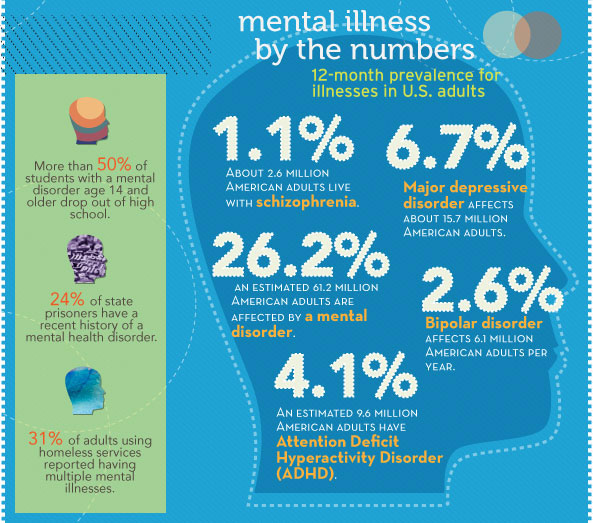Shining a light on mental health awareness
Questions all mental health services providers need to ask themselves about managing risk.

May is Mental Health Awareness Month, and while this is often a personal issue for many, this is a great time to learn that your business can be involved, too. How do you prepare for mental health issues like anxiety disorders, behavioral issues and substance abuse?
Learn how to recognize symptoms and conditions of mental health disorders
According to the U.S. Department of Health and Human Services, mental health problems affect everyone either directly or indirectly. Some staggering facts that were collected in 2014 can put it in perspective:
- One in five American adults experienced a mental health issue
- One in 10 young people experienced a period of major depression
- One in 25 Americans lived with a serious mental illness, such as schizophrenia, bipolar disorder, or major depression
- Suicide is the 10th leading cause of death in the United States
- Even very young children may show early warning signs of mental health concerns
The range of disorders is wide and individuals can suffer simultaneously from multiple disorders. From phobias to eating disorders to post-traumatic stress disorder, the signs and symptoms vary from person to person. Being educated on the conditions and symptoms can be key to recognizing a problem. Government sites like MentalHealth.gov can be a useful resource to get you started.
Brought to you by MSW@USC Masters in Social Work
Is social media part of the problem?
Studies show that 63% of Americans log on to Facebook daily, and 40% log on multiple times each day. Because posts are often idealized versions of what is truly happening or how something appears, people tend to compare their own situations and think less of their own lives.
A study that explored the relationship between teenagers, social media, and drug use found that 70% of young adults ages 12 to 17 use social media. The daily users are five times more likely to use tobacco, three times more likely to use alcohol, and twice as likely to use marijuana.
A study from the University of Michigan collected data about Facebook users and how it correlated with their moods. Results showed that not only were avid users unhappier than less frequent users, but they also reported lower satisfaction in their overall lives over long-term use
New technology may be part of the solution
Secure virtual consultation sessions are becoming more common along with online and social tools for patients to assess and monitor their progress. “Ellie,” created by University of Southern California scientists, asks questions of patients using a sensor and webcam to measure reactions when answering the questions. These readings instruct Ellie on how to interact effectively. “Decision support tools” like Ellie can help mental health professionals broaden their reach. A recent PwC report found that 72% of consumers in the 18 to 44-year age group are willing to use telehealth services to consult with a mental health provider versus face-to-face visits.
Is my mental health facility properly insured?
As the need for mental health services grows and further stretches the capacity of current providers which is resulting in the use of new technologies to deliver services, additional risks will emerge including data security and professional liability. Insurance solutions are available to protect Mental Health Service facilities and professionals against these risks.
If you are a mental health service facility owner or professional, here are some key questions to ask yourself:
- Are my facilities safe for my clients from physical and emotional danger?
- What is my back-up plan if something happens to my facility?
- Are my patient records protected in the event of a disaster to my facility?
- If I use technology as a diagnostic tool, how is my patient’s privacy protected?
- When I am traveling with or to/from my clients, am I protected for property damage to my vehicle or liability?
- Am I protected if one of my employees causes a property or liability loss when not following my established policies and procedures?
Nationwide risk management solutions for mental health care service facilities
Nationwide offers resources to the policyholders in the Human Services community that provide services to the Mental Health Care sector. As an industry leader, Nationwide understands that mental health care service facility owners and professionals require solid risk management advice along with their insurance to help mitigate and prevent losses. Through our Special Care Services Division, Others First®, our underwriters combine decades of experience evaluating insurance to meet your individual business needs. Contact an agent to find out what we offer in property, general liability, professional liability and auto protection.

